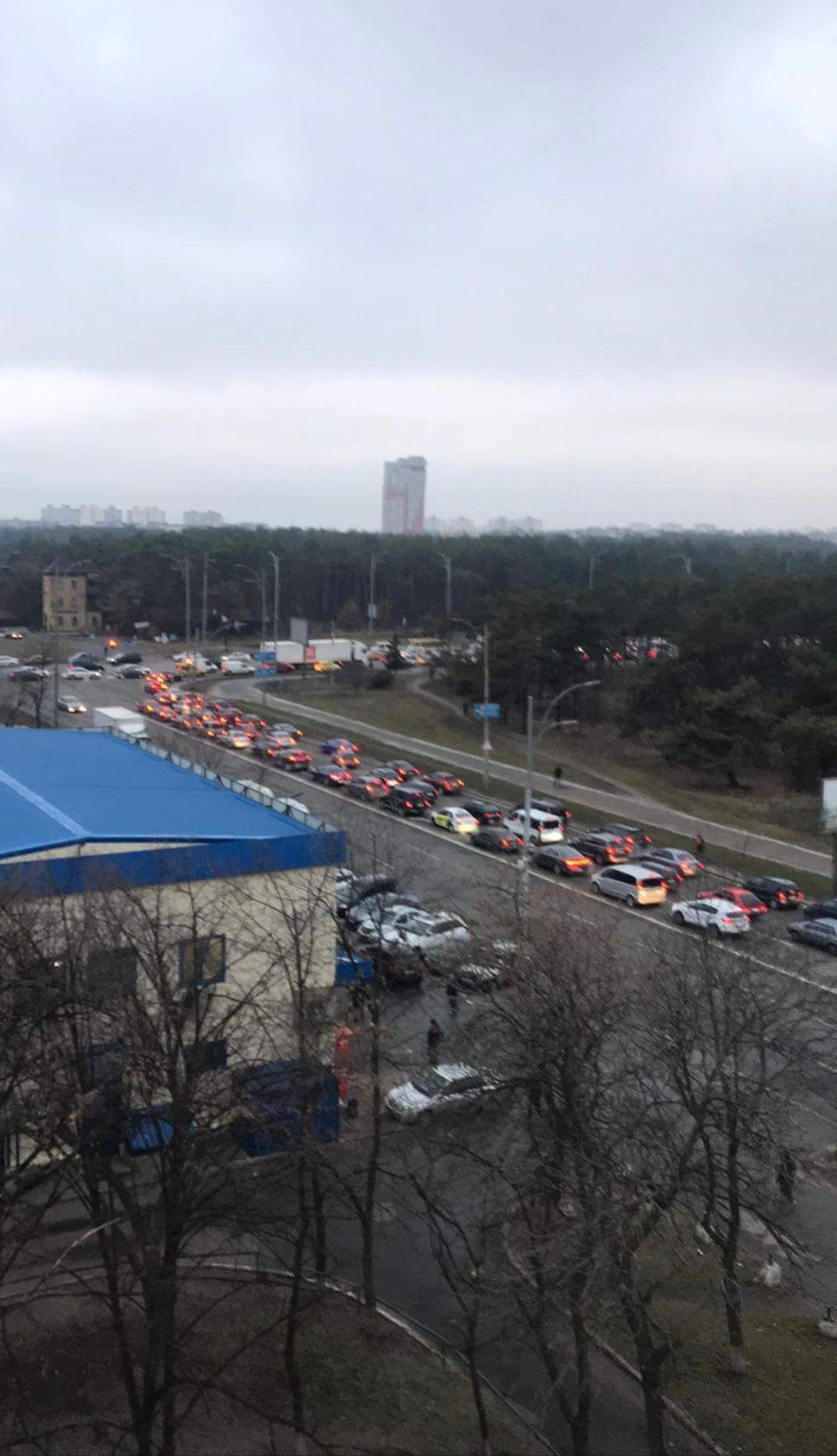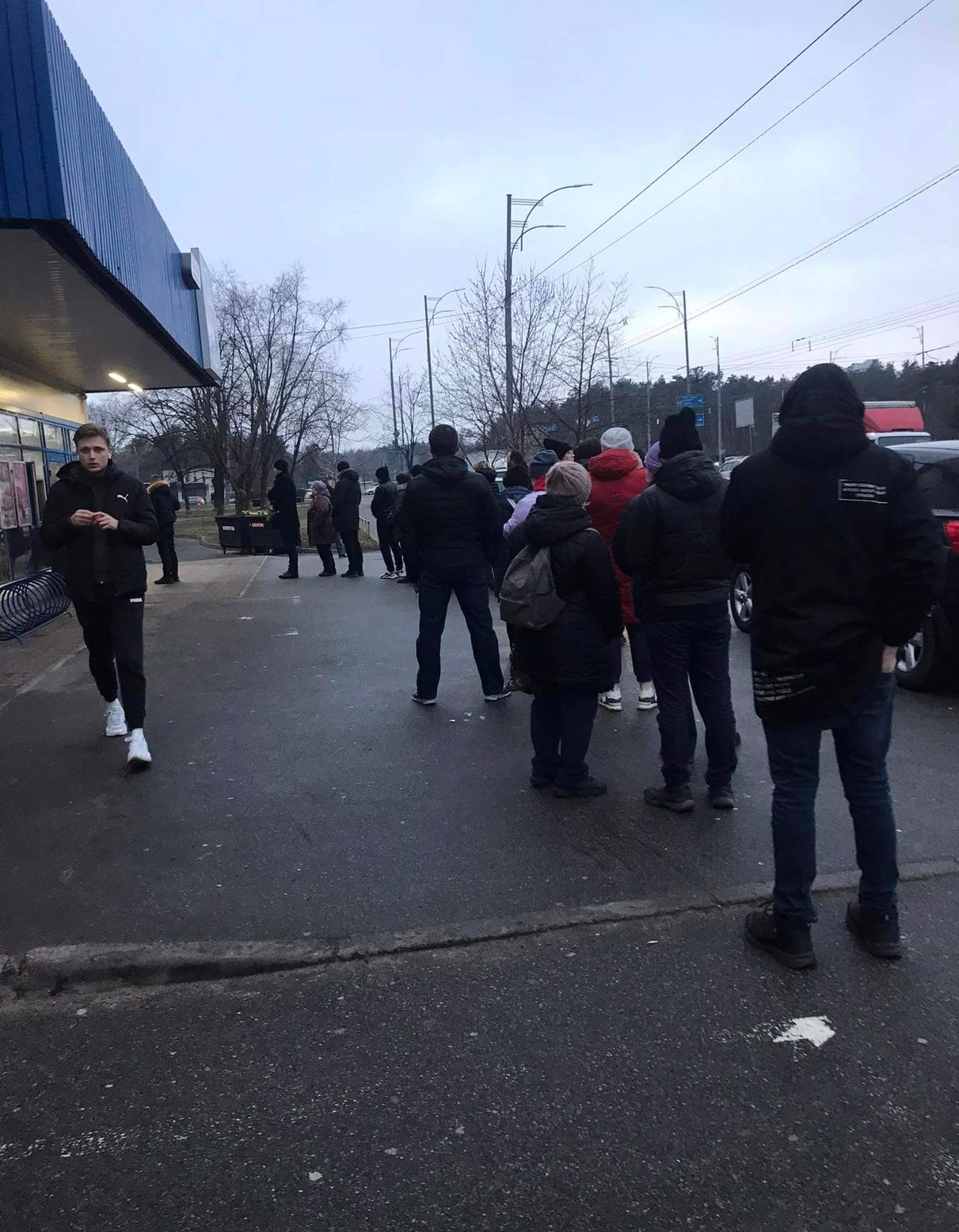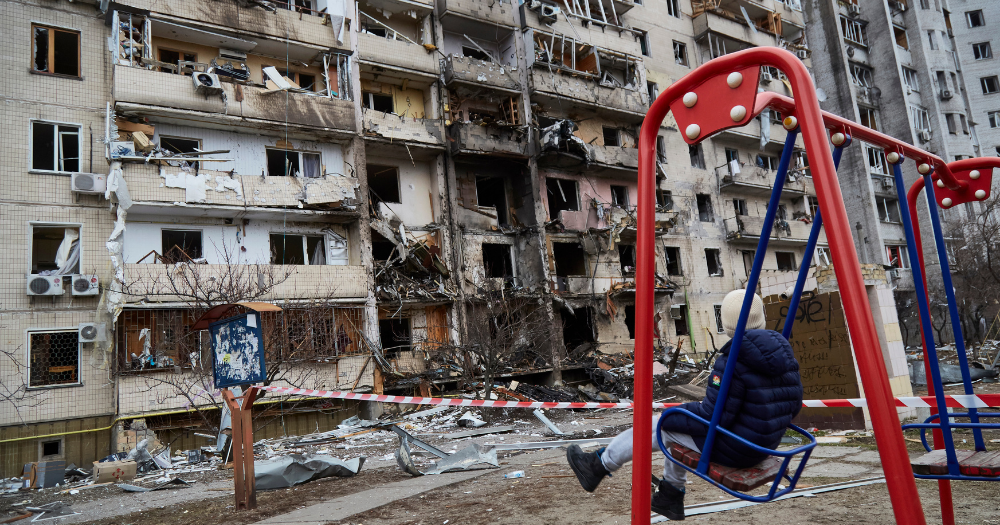PERSPECTIVE: “Being away from Ukraine, away from my family at this point is… I feel so sad that I can’t be next to my parents right now. I’m afraid there is a chance they can lose mobile connection and I will not be able to talk to them. And what’s even worse is that I could lose them…”
On Feb. 24, Russia invaded Ukraine. In the days since, heavy shelling has taken place, along with many clashes between the Ukrainian military and the Russian Army.
We spoke to three young Ukrainians based in Singapore about how they have been coping with the situation unfolding in their home country.
Nina Monzolevska is 23 years old and moved to Singapore six months ago. She works as a social media marketer and model and is originally from Kyiv.
Sheremet Darina Alekseevna is a 20-year-old model from Kharkiv. She moved to Singapore more than a year ago to reunite with her boyfriend, Singaporean actor Edwin Goh.
Nikita Taratorin is a 21-year-old student at Yale-NUS College. He is from Kyiv but spent a significant part of his childhood in Crimea, a peninsula of Ukraine that Russia annexed in 2014.
They shared how the past couple of days have been immensely stressful and fear-inducing for them and what they've been doing to be involved.
Finding out about the invasion
Monzolevska and Alekseevna both heard the news from their own families.
“On Feb. 24, 2022, I woke up and saw missed calls and messages from my friends and family that the war had begun,” Alekseevna said.
Monzolevska had just arrived at her office when she received an unexpected call from her parents in Kyiv. This was somewhat out of the blue because they usually talk at around 9-10pm Singapore time.
“Once I picked up the phone, I instantly realised that they were going to tell me bad news.
They called me in tears to say goodbye in case they do not make it, which is very scary.”
Taratorin first heard of the invasion — the worst-case scenario he had feared — from the news, he immediately tried contacting his family:
“So at that point, I just wanted to make sure that my family is safe and that I can still contact them.
I was able to get in contact with them. I contacted them at like, 4 or 5am Ukrainian time. And they were already partially up because they already heard the explosions.”
Anxious, scared for family
Being nearly 9,000 miles away from their families and the events unfolding on the ground has left the three Ukrainians feeling helpless and anxious. A particular worry has been the ability to contact their families.
Alekseevna expressed:
“Now I’m feeling very anxious, it’s hard for me to imagine such a war. I have never seen such a thing in my life, and I’m scared and worried for the safety of my family.
My whole family is currently in Ukraine, except for me. While I can keep in touch with them, communication with them can be lost at any moment. My mother said that there were problems with telephone communication, and she could not get through to my grandmothers.
My family has collected all the necessary things and documents so that in the event of a war, they need to quickly leave their home and hide in a shelter that is already open to people.
There is nowhere to fly or leave to — all roads are blocked, and airports are closed as there is news that the airports had been bombed.”
Taratorin echoed similar fears:
“Up until now, I still have contact with my family. I think the biggest thing I'm scared about is losing contact with them.
Ukrainian society as a whole is very deeply unsettled right now and quite anxious. Quite a few people are panicking as well. And a lot of people are trying to flee to the west because of the fighting.
While the rocket attacks were happening, my sister was packing in the dark. My family was packing in the dark because they did not want to turn on the lights, as they did not want to attract the bombing and attract the shelling.
The only plan that my family had was just to sit in the car and go west because we are being attacked from the north, south, and east right now. And because of that, you know, the most logical — and I guess the safer — option is just to go west.
But the problem is that we have nowhere really to go in the West [Western Ukraine]. And it's not clear whether we would have to cross the international border.
However, the roads were so congested that my family decided that it would be safer to stay temporarily back until the congestion eased up. Now, many transport pathways from Kyiv are a target. It's very unsafe and almost impossible to realise this plan.
Monzolevska spoke of the situation on the ground on the first couple of days:
“People are obviously panicking a lot. After the missile strikes, you could see long queues at ATMs, grocery stores, and also many cars on the road because everyone wants to leave the city.
Also, at this exact moment, my parents are telling me they are hearing the explosion sounds and that the windows are shaking.”
 Photo courtesy of Nina Monzolevska.
Photo courtesy of Nina Monzolevska.
 Photo courtesy of Nina Monzolevska.
Photo courtesy of Nina Monzolevska.
Invasion is the worst-case scenario
Monzolevska never imagined that an invasion like this would actually happen:
“No one could believe that Russia would invade Ukraine. We all thought they could come to an agreement and that would be the end of it.”
Alekseevna had also hoped for a different outcome:
“I have no words about what is happening in Ukraine now. We did not expect such a large-scale invasion; we had hoped that common sense would take over.
It is very vile to bomb Ukraine in the early morning when everyone is still sleeping. For eight years, we have been hoping for a peaceful resolution of the conflict because we do not want the lives of innocent people to be affected.”
Taratorin, however, had always worried the situation could escalate to this point:
“[Invasion] was always something that I feared most since 2014, because of the implications for me and my family, and because of the fact that we were literally having an armed conflict, and our territory was already invaded and annexed in 2014.
So the possibility of this happening has never ever faded away. And I did expect some escalation or some provocations or something to happen in the near days and weeks because of all the troop amassment and everything, but I honestly hoped that it would not get to the point of a full-scale invasion.
Ultimately, this is something I feared the most and is the worst-case scenario.”
History repeating itself
Taratorin, a Global Affairs major, said it felt like history was repeating itself.
“For me, I am very well aware of my history of being Ukrainian, and of the colonial nature of the history of Russian and Ukrainian relations."
A Washington Post article on Feb. 24 said that to understand the Ukraine-Russia conflict, one had to look to colonialism.
The article noted how former Soviet states are rarely referred to as "post-colonial" but rather "post-Soviet", which falsely gave the idea that liberation of these states only took place after the collapse of the Soviet Union.
In fact the article pointed out that these countries, including Ukraine, "nurtured national movements for hundreds of years before finally getting to experience independence".
It was these national movements Taratorin pointed to when framing the relationship between the two countries. He talked about how Ukraine had invaded since the 1200s, how they were brutally suppressed for centuries, and pointed to the hundreds of laws passed against "Ukrainian culture and language".
"So as a Ukrainian, to me, it is not surprising that history, unfortunately, keeps on repeating itself."
Taratorin also pointed out that Putin does not see Ukrainians as having "their own culture, their own history, their own identity, and most importantly, their own dignity".
Putin has said before that modern Ukraine was "entirely created by Russia".
Taratorin said that Ukraine has built a "successful democracy" since the Revolution of Dignity in 2014.
Putin cannot allow "a successful democratic country prospering" right beside Russia, stated Taratorin, a point also brought up in an Atlantic article positing the reasons for invasion.
Needless to say, Taratorin does not think much of Putin's reasons for not wanting Ukraine to join NATO.
"I see this whole issue as just an unfortunate repetition of history that the world, unfortunately, was not able to prevent, and colonialism of the 21st century in the making.”
Very difficult being away, but doing what they can
All three spoke of their struggles of being away from their home and families, even though they are safe overseas.
Monzolevska said:
“Being away from Ukraine, away from my family at this point is… I feel so sad that I can’t be next to my parents right now.
I’m afraid there is a chance they can lose mobile connection and I will not be able to talk to them. And what’s even worse is that I could lose them…"
Alekseevna expressed helplessness at being unable to do much:
“Being away from your country at a time when there is a war is terrible because you can’t do anything about it. It is also scary that your family and friend are in danger and they can’t leave the country.”
And Taratorin said that while he would have enlisted to fight if he was he back home, his parents insisted he stay overseas, where he would be safe.
“And honestly, this brings up quite a bit of guilt because I'm here sitting in safety and stability and my family is under a threat of becoming refugees in the next 24 hours.”
He said the whole situation has brought about feelings of extreme anxiety, anger, and hatred.
However, he has been able to channel these intense emotions into doing what he can overseas.
He has been using his platform, creating awareness, and asking people for support and donations. He also feels every Ukrainian out there is striving to help the cause in some way.
"If you're in safety here and you cannot do anything and you're worried about your family, you have all this anger and frustration and anxiety to do stuff. It serves as fuel for me."
He considers those feelings the most sincere form of love to country, identity, and loved ones.
Monzolevska and Alekseevna are also channelling their energy into raising awareness about what is happening in their home country.
Alekseevna has been actively sharing information and clips of what is happening in Ukraine with her over 13,000 Instagram followers.
Monzolevska also took to social media to spread awareness, sharing an Instagram reel juxtaposing what Ukraine looked like when she was last home with clips of the current state of bombing and fighting.
She also said that she has donated money to the Ukrainian army and has also encouraged others to do so.
Hope for what comes next
As Russia continues to press on in its invasion of Ukraine, the three Ukrainians said it is hard to predict what the future will hold.
Monzolevska said Ukraine needs the "support of the entire world" — economic support, moral support, political support — to stop Putin.
Alekseevna also emphasised the importance of help, saying that she very much hoped "this conflict would be resolved in the near future" and that there would be help from all countries.
I hope the sky in Ukraine can be peaceful and not one filled with bombs and smoke. Take care of your family and friends, I wish you all a peaceful sky over your head.”
While Taratorin thinks the situation will likely continue to escalate, he also shared his belief that Ukrainians will continue to fight back.
He pointed to the rising number of Russian casualties as a possible deterrent to a prolonged invasion by Russia, which he hoped would drive home the point that "the war is a bloody thing that nobody wants".
Taratorin also spoke of how far Ukrainian people were willing to go to protect their country, saying they had "spilled a lot of blood to defend and protect this land before".
"You know, Ukrainians are very hospitable people by nature; unless you come as an invader. If you come to Ukraine, we would greet you with bread and salt, as our tradition says. But if you come here to take our land, or if you come here to destroy our identity, we will of course fight, and we will fight hard."
A message for Singaporeans
Alekseevna ended with this message for Singaporeans:
“I want Singapore to know that our army can withstand the attacking forces and all the forces to fight for Ukraine."
She added that Ukraine would not "give up its freedom".
"For us, independence and the right to live on our own land is the highest value.”
Taratorin said Singaporeans should not ignore the current crisis, and emphasised just how much living in peace and safety is a privilege, but how it should be a "universal human right".
“And people right now are dying. Lands are lost. People lose their livelihoods. People are becoming refugees. This is currently the world's largest and most volatile conflict. And in any conflict, civilians are the ones suffering the most. There'll be millions of refugees, which, I hope not, but might include my family as well.
And, you know, you might not ever expect this to happen to you. But once it does, you understand how fragile this is."
What the world is seeing right now is "international order and law being compromised", Taratorin said, the same law and order keeping Singapore and other smaller countries safe from larger aggressors.
He warned that if this "delicate order" is compromised, more conflict and violence will be carried out by those emboldened by this crisis.
And that, he argues, is a very serious issue for the entire world regardless of how far the current conflict is.
He also wanted to share a chant that's very popular in Ukraine.
In fact, Ukrainian President Zelensky very recently ended a video with just this call.
⚡️Ukraine’s Zelensky posts a new video of himself and his team outside the presidential administration in Kyiv’s government quarter after rumors in Russian media that he’d fled. “We are here. We are in Kyiv. We are defending Ukraine.” pic.twitter.com/bgHyrsbVFs
— Christopher Miller (@ChristopherJM) February 25, 2022
"It basically translates to ‘Glory to Ukraine’. And the chant was used by our ancestors to defend their lands and pretty much embodies the Ukrainian spirit of freedom that we have. It's ‘Slava Ukraini!’
And then usually in Ukraine, people will respond, ‘Heroiam slava!’ — ‘Glory to heroes!’”
Read more:
Quotes have been edited for clarity and grammar. Top photo by Pierre Crom/Getty Images.
If you like what you read, follow us on Facebook, Instagram, Twitter and Telegram to get the latest updates.
